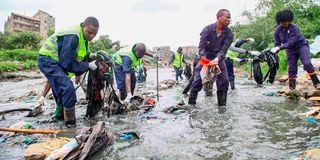Why current Nairobi river clean-up is futile

Members of Komb Green Solutions clean up a section of Nairobi River in Korogocho, Nairobi, on October 10, 2024.
According to recent media reports, President William Ruto has committed himself to cleaning up Nairobi River. He has taken it upon himself to deliver a crystal clear river.
As the President gets to work on the ambitious and certainly very expensive project, he needs to find out which are the main pollutants. Accusing fingers have often been pointed at industries built along the river, but this is not entirely the case. The President and the Nairobi governor should address two glaring features of the city, otherwise the cleanup of the river will be an exercise in futility.
Number one is garbage. Successive county governments have been unable to manage the huge volumes of garbage generated by the city residents. Unless the county government comes up with workable plans to manage garbage, the river will continue to be choked with garbage tossed into the river at midnight by various businesses and households. Every ward within the city should have a well managed and equipped garbage disposal department.
Several years ago, the county government purchased a huge piece of land from the Murang’a County at a place known as Gikono. The objective was to shift the dumping sites in Nairobi to Gikono. The Nairobi County government went as far as tarmacking the road from Kabati to Gikono. This, however, never took off, possibly after Murang’a residents started remarking sarcastically that they are supplying Nairobi with water but getting paid with garbage.
The Nairobi County government must put in place long-term measures for managing the garbage problem.
The second issue is the lack of a proper sewerage system. High-rise apartment blocks all over Nairobi are resting on soak pits. Raw sewage is permanently drained into the same Nairobi River the President is determined to clean up.
The problem has been there for decades and it is evident that the county government has been unable to keep pace with developers in provision of essential amenities.
The city needs a marshall plan to clean it up. It is not too late to get it done, but certainly before any clean-up of Nairobi River.
Sammy Ng’ang’a, Nairobi

